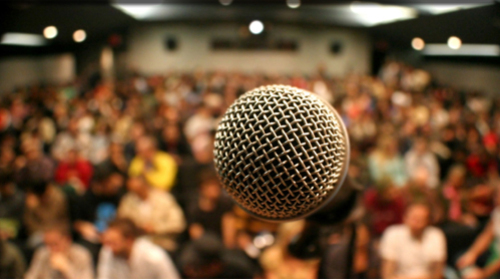In public speaking, being present is vitally important to creating a connection with your audience. When you’re paying attention to what's happening in you and around you, this connection (and what you’re saying) resonates with much greater depth.
Your body is a brilliant indicator of what’s really going on inside you; it is so much more than a mere receptacle that houses your brain. Yes, it requires oxygen, water, food, hygienic attention, exercise/movement, clothing, etc.; but it gives you so much in return for this care. Your body is constantly offering you signals about what’s happening in you and around you—and in ways that go far deeper than just your conscious thoughts. Signals about what you’re really feeling. Where that feeling resides in your body. The quality of that feeling. Whether it’s fleeting or something that’s been lingering for awhile that you need to address. Your sympathetic (unconscious) and parasympathetic (conscious) systems will operate in beautiful symmetry—if you let them.
photo credit: jcipenticton.com
So how do you get present?
The key is to tune into what your body is saying to you. You may have thought of sweaty palms and armpits, wobbly knees, and an accelerated heart-rate as signs of fear. But what if these signals are really just a powerful indication that you’re alive? There are lots of situations in life where we experience sweaty palms, weak knees, and increased heart-rate…and many of them have nothing to do with fear. Consider falling in love and what that feels like! It’s all about how you’ve interpreted those signals in the past and how you want to interpret those same signals now.
What happens when you don’t pay attention to your body’s signals?
It is said that everything that happens to us is stored inside us. I believe this is true. And, all this data (whether your mind has acknowledged it or not) is in there, stored at the cellular level. It is also said that we only use about 10% (or less) of our brain’s capacity to process. That means the other 90% must be available to you somehow, but just not in the conventional ways your conscious mind is used to accessing data. When you don’t listen to what your body is telling you, you miss out on some of that 90%. Ignoring messages from your body is a recipe for sickness, depression, lower energy, and unresourcefulness. As a speaker, when you are not listening to your body, you are far less present and available for connection to your audience.
When you actually start listening to the messages your cells are shouting at you…and trusting that there’s always truth there, in some form or another…you’ll definitely be more present. You’ll likely be healthier, happier, clearer on your boundaries, and have more energy too—but that’s a whole other conversation.
Reframe physical signals into positive energy
Before you next get up in front of a group of people, if you notice that you have sweaty palms, your heart is pounding, and your breath is a bit accelerated, know that you have a choice. Instead of interpreting those sensations as indicators of fear, you can choose to see them as excitement, vitality, exhilaration, and energy—all available for you to access and draw on as you speak. Remember, physical sensations might look EXACTLY the same in different situations. It’s the story we make up about what those signals mean that changes everything. In each moment you have an opportunity to HARNESS and ACCESS that beautiful energy and let it HELP you as you talk.
What a difference it makes when you reinterpret and reframe those signals as positive and powerful energy that is available to you. Energy that is spurring you to be present and be yourself. Your audience wants to see the real you. Not a mask or a persona or a larger-than-life cartoon. When you are not fully present to yourself and your audience, you are robbing yourself of an opportunity to show up in all your magnificence and you’re robbing them of a chance to experience the best of you.
So get present. Take a breath. Leap into trust.
If you want to be a compelling, dynamic, and authentic speaker there is absolutely NO SUBSTITUTE for being present.

